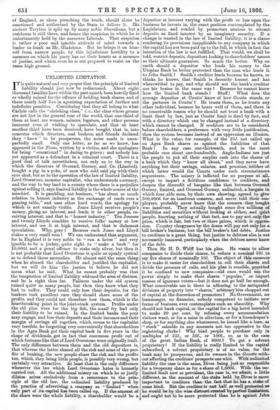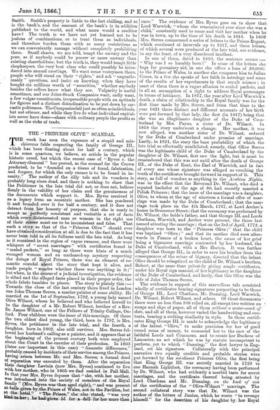UNLIMITED LIMITATION.
Prisquite natural and very proper that the principle of limited liability should just now be redisenssed. About eight thousand families have within the past month been heavily fined or wholly ruined for the offence of holding bank shares, and of these nearly half live in agonizing expectation of further and indefinite penalties. Considering that they all belong to what Carlyle calls the "shrieking class," i. e., the class whose groans are not lost in the general roar of the world, that one-third of them at least are .women, minors, legatees, and other persons innocent even of wishing to speculate, and that at least another third have been deceived, have bought, that is, into concerns which directors, and brokers, and friends declared they " knew " to be prosperous, the noise made is unex- pectedly small. Only one letter, as far as we know, has , appeared in the Times, written by a victim, and she apologizes for being " sensational " in daring to grieve; and nobody his yet appeared as a defendant in a criminal court. There is a good deal of talk nevertheless, not only as to the way in which the directors of Overend, Gurney, and Co. (Limited), bought a pig in a poke, of men who sold said pig with-their eyes shut, but as to the operation of the law of limited liability, Lord Overstone. monster capitalist, who understands currency, and the way to buy land in a county where there is a prejudice against selling it, says limited liability is the whole source of the mischief. It is gambling, not business, "has about as much relation to honest industry as the exchange of cards over a gaming table,"" and uses other hard words, the apology for which. is • not exactly visible. Jones Lloyd receives people's money, giving no interest, and lends it to other people, re- ceiving interest, and that is," honest industry." Ten Joneses and twenty Lloyds combine to receive, folks' money at low interest, and use it at high interest, and that is dishonest speculation. Why, pray ? Because each Jones and Lloyd stakes a very small 'sum ? We can understand that argument, for in England it is very noble to "run a horse " and very ignoble to be a jockey, quite right to "make. a book?' for 10,000/. and a penal offence to stake only silver, but then it is not probable that Lord Overstone is quite so openly cynical as to defend those anomalies. He almost said the same thing, when he abused the shareholder and justified the capitalist, but we will do him the justice to believe he did not mean what he said. What he meant probably was that the temptation of limited liability widened the area of distress, and he is right thus far.. Failures under the old system ruined quite as many people, but then they knew what they had to suffer. They could only lose their deposits, for the bankers took excellent care they should share none of the profits, and they could not therefore lose them, which is the heartbreaking point in the joint-stock system. Profits under the old plan were for the big fish, the small fry had only their liability to be ruined. In the limited- banks the poor may engage, and lose their deposits and their incomes and their margin of savings all together, which seems to the capitalist very terrible, he forgetting very conveniently that shareholders in the Agra Bank got their capital back in five years in the shape of dividends, got in fact that enormous. profit out of which fortunes like that of Lord Overstone were originally built. The only difference between them and the old depositors is, that whereas the latter shared all the risk and none of the pro- fits of banking, the new people, share the risk and the profits too, which, they being little people, is possibly very wrong, but certainlyvery attractive. At least that is the only difference whenever the law which Lord .Overstone hates. is honestly. carriecVout. All the additional misery on which he so justly dilates arises exclusively from a recurrence to the prin. ciple of the old law, the unlimited liability, produced by the practice of advertising a company as "limited" when only part of its capital has-been called up... If the amount of the share were the whole liability, a shareholder would be a depositor at interest varying with the profit or loss upon the, business he invests in, the exact position contemplated by the:, Legislature, and evaded by promoters anxious to attract deposits as fixed interest by an imaginary security. If a change is wanted in the law of limited liability, it is a clause. rendering its provisions inapplicable to any company in which the capital has not been paid up to the full, in which in fact the. intention of the law is not fulfilled, That would, we shall be told, restrict deposits, depositors looking to shareholders' names as their ultimate guarantee. So much the better. Why on earth should a depositor who lends his money to the. Utopian Bank be better protected than the man who lends it to John Smith ? Smith's creditor lends because he knows, or' thinks he knows, that Smith is decently honest and has- wherewithal to pay, and why should not the bank's creditor- use his brains in the same way? Because he cannot know how the limited bank stands ? Stuff 1 What does the. average depositor at C/outts' know of how °Putts stands, or, the partners in Coutts' ? He trusts them, as he trusts any other individual, because he hears well of them, and there is: no conceivable reason why he should not trust a bank with a- limit fixed by law, just as Coats' limit is fixed by fact, and with a directory which can be changed instead of a directory. which cannot be changed. If creditors axe to be considered. before shareholders, a preference with very little justification, then the system becomes instead of an oppression an illusion. What is the value, for example, of the 25/. not called up. on Agra Bank shares as against the liabilities of that Bank ? In any case one-thirteenth, and in the most. probable case about one-hundredth. Anglo-Indians are just the people to put all their surplus cash into the shares of a bank which they "know all about," and they never have anything but their savings, salaries, and pensions, neither of which latter would the Courts under such circumstances- sequestrate. The misery is inflicted for no purpose at all, except to impart a fictitious confidence to creditors, and deepen the discredit of bargains like that between Overend Gurney, limited, and Overend Gurney, unlimited, a bargain in which four. able men, by ,fhsir own showing, agreed to give 500,000Z fOr an insolvent concern, and never told their em- ployers, probably never, knew that the concern they bought was insolvent. They, actually bought some .five millions of liabilities and securities without looking at .either, and quiet people, knowing nothing of that fact, are to pay, not only the price; which is fair, but two or three prices, which is oppres- sion. Cazntry clergymen:bp the dozen will pay not only for a bill broker's business; but the bill.broker's bad debts, Justice to creditors is a great thing, but justice to debtors, also is not necessarily immoral, partickdarly when the debtors -never knew of the debt.
• Then Sir if. D. 'Pail has his plan. He wants to allow companies to divide their shares, to reduce a nominal 50/. to say five shares of nominally 10/. The object of this measure- is to make it easier for shareholders to sell their shares and divide the pressure of calls, and, his 'plan is sensible, provided it be confined to new companies—old ones would use the power simply to make their, shams "popular," or import masses of ignorant voters—but it does not go half far enough. What conceivable use is there in adhering to the antiquated divisions of property into "shares," arbitrary bits chopped out of capital at the discretion-of promoters ? No Government, no. loanraonger, no financier, nobody competent to initiate new forms of business, ever contemplates such an absurdity. Why should not bank capital, or the capital for a big hotel intended to make 20 per cent. by refusing every accommodation visitors want, or for a mine in alluvium, or for a linendraper's shop, or for anything else whatsoever, be issued like a loan, as "stock" saleable in any amounts not too oppressive to the. registering clerks? Why bind people to purchase only in multiples of 251., or 501., or 1001., or, as in the case of the great Indian Bank,. of 8001.? To get a solvent proprietary? If the liability is really limited to the capital subscribed, a solvent proprietary is of no value, for the bank may be prosperous, and its owners in the Gazette with- out affecting the creditors' prospects one whit. With unlimited liability the case is the same, Dives being just as responsible for a twopenny share as for a share of 1,000/. With the un- limited limit now so prevalent, the case is, we admit, a little different, as the amount of the.stake held by Dives is more important to creditors than , the fact that he has a stake of some kind. But the ereditor.is not half as well protected as he would be by the wise distrust created by perfect limitation, and ought not to be more protected than he is against John Smith. Smith's property is liable to the last shilling, and BO is the bank's, and the amount of the bank's is in addition published to the -world, and what more would a creditor have ? The truth is we have not yet learned not to be jealous of combinations, or to treat them as individuals, and therefore burden them with as many restrictions as we can conveniently manage without completely prohibiting them. Small shares, we are told, tempt the unwary and the poor, as if anybody could be poorer or more unwary than existing shareholders; but the truth is, they would tempt little shopkeepers, the very best class who could possibly be intro- duced into annual meetings. We want some vestrymen there, people who will stand on their "rights," and ask " ungentle- manly " questions, and insist on knowing, when they have bought six millions worth of "securities," whether anybody besides the sellers know what they are. Vulgarity is useful sometimes, and our Joint-Stock Companies want, sadly want, a few vulgar-constituents, irrepressible people with an aptitude for figures and a distinct disinclination to be put down by sar- castic politeness. The Companiesfail just as often as individuals, but not oftener, and while they live do what individual capital- ists never have done--share with ordinary people the profits as well as the risks of trade.































 Previous page
Previous page